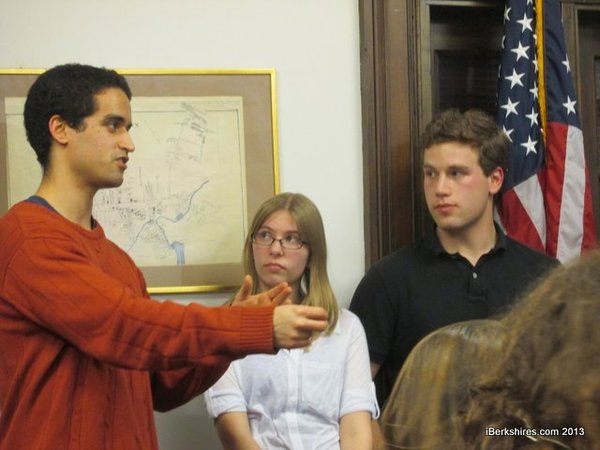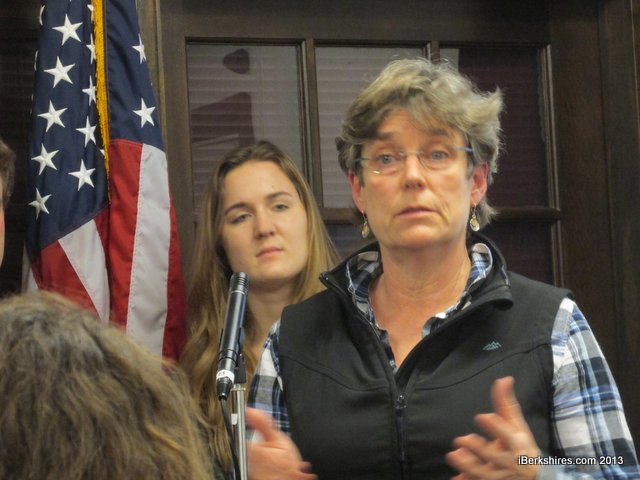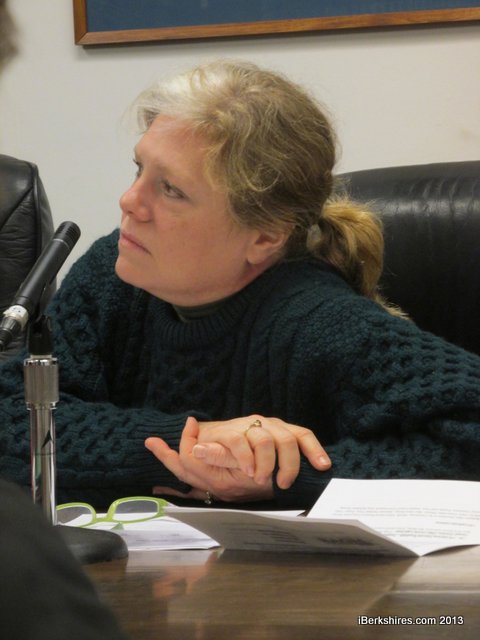Williams Students: Potential for More Farmland MatchingBy Stephen Dravis, Williamstown Correspondent
10:19AM / Tuesday, December 17, 2013 | |
 Williams students explain their research to the Williamstown Agricultural Commission. Williams students explain their research to the Williamstown Agricultural Commission. |
 American Farmland Trust New England Director Cris Coffin discusses the research conducted on behalf of her organization. American Farmland Trust New England Director Cris Coffin discusses the research conducted on behalf of her organization. |
WILLIAMSTOWN, Mass. — A study by Williams College students suggests area agriculture advocates think big by thinking small.
The key to expanding local food production in Northern Berkshire County lies in promoting small-scale partnerships between landowners and new or existing farmers, according to "A Future for Farming: Land Leasing in Williamstown and Adams."
Four students in professor Sarah Gardner's Center for Environmental Studies class presented the results of their research at this month's meeting of the Williamstown Agricultural Commission.
The students queried the owners of 370 properties of 4.5 acres or more in Williamstown and Adams.
About a quarter of those surveyed responded to the study, and a third of those respondents said their land already was in agricultural production. Among those whose land is not being cultivated, a sizable proportion reported interest in letting someone else work the land, the students said.
"The big takeaway was the lack of specific knowledge," Isaac Maze Rothstein said.
"Most people are interested in getting more information. When we talked to them, we found that while they wanted information, they weren't going to go looking for it themselves. They weren't interested in being proactive."
That is why the students recommended that local groups like Berkshire Grown and town agricultural commissions take the first step and educate landowners.
"There is an opportunity for education," Julianne Fontana said. "When we talked to different people, they had different ideas of what farming is. Some understood it as orchards, some as just growing crops. ... People need to be better educated on what different farming practices are.
"Hold some sort of forum where interested landowners could come and meet interested farmers. Have landowners come and talk to the ag commission or talk to organizations like Land for Good."
The students said the newenglandfarmlandfinder.org website is a valuable regional resource, but "land matching" might be more extensive if there was a push at the grassroots level.
"We don't see one group of people or organization going out and doing it on their own," Nick Kraus said. "We recommend multiple groups come together and pool their resources. In Williamstown and Adams, specifically, ag commissions, Land for Good, the Berkshire Regional Planning Commission and, in Williamstown, the [Rural Lands Foundation] are good resources."
 Commission Chairwoman Beth Phelps listens to the presentation. Commission Chairwoman Beth Phelps listens to the presentation. |
The students conducted their study on behalf of one of the organizations looking to promote agriculture nationwide, the American Farmland Trust. The New England director of the AFT, Cris Coffin, who is based in Northampton, attended the Williamstown presentation.
The students' professor, Gardner, is an alternate member of Williamstown's Agricultural Commission. She said the body and similar boards in other towns could expand their missions to include education about land matching.
"Now that a lot of towns have formed ag commissions, the towns have passed Right to Farm laws, and the ag comms don't know what else to do," Gardner said. "This could hopefully keep them busy."
And connecting landowners with would-be farmers will keep the latter busy.
"In Massachusetts, as we see around the rest of the region, access to affordable farmland is one of the biggest barriers to new and existing farmers," Coffin said. "For us, [the study] was trying to understand more about what landowners are willing to do and what type of agriculture they could imagine, whether they have preconceived notions about what kind of farming they like or don't like."
Coffin cited research by Brandeis professor Brian Donahue, who has looked at New England agriculture on a large scale and found that the region, which currently imports the overwhelming majority of its food, can be more self-sufficient.
"Their research says New England could meet up to 80 percent of its food needs if instead of 2 million acres in production it had 6 million acres in production," she said. "That's a very big picture study. ... But it makes you realize that if we want to be more regionally food secure, having more land in production would be a key to doing that."
| 
 MEMBER SIGN IN
MEMBER SIGN IN
 MEMBER SIGN IN
MEMBER SIGN IN